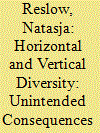| Srl | Item |
| 1 |
ID:
163651


|
|
|
|
|
| Summary/Abstract |
Unintended consequences arising from EU external migration policy are a result of the multi-actor nature of this policy and of policy interactions. In addition, scholars face serious methodological challenges in establishing what the EU’s ‘intent’ is in external migration policy and, therefore, in determining which consequences are intended and which are unintended. The literature on the implementation and evaluation of EU external migration policy is in its infancy, and future work should take into account all policy outcomes – both those that were intended and those that were not.
|
|
|
|
|
|
|
|
|
|
|
|
|
|
|
|
| 2 |
ID:
170411


|
|
|
|
|
| Summary/Abstract |
Developed and developing countries are increasingly cooperating on migration management, and human rights NGOs have harshly criticised these instruments for cooperation. This article asks how and to what extent parliaments are challenging policies for international cooperation on migration management. On the one hand parliaments have traditionally been described as ‘moral tribunes’ in international relations, due to their principled support for human rights. On the other hand, parliaments are increasingly operating in political systems marked by anti-immigrant sentiment and increased support for right-wing populist parties. How do parliaments navigate between these two poles when it comes to international cooperation on migration management? Based on examples from Australia, the EU and Israel, this article shows that the use of non-legally binding instruments for cooperation limits the formal role of parliaments, but also and more importantly that there is a lack of political will to scrutinise these instruments and hold executives to account (notwithstanding attempts by some members of parliament or some political groupings to challenge policies through informal means). The lack of political contestation implies that, as far as migration management is concerned, ‘politics stop at the water's edge’.
|
|
|
|
|
|
|
|
|
|
|
|
|
|
|
|